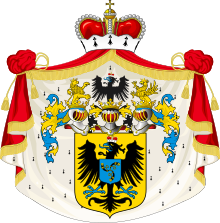Krzysztof Mikołaj "Perkūnas" Radziwiłł
Krzysztof Mikołaj Radziwiłł "Piorun" | |
|---|---|
 | |
| Born | 1547 |
| Died | 20 November 1603 |
| Board member of | Calvinist |
| Spouse(s) | Katarzyna Sobek z Sulejówka h. Brochwicz Katarzyna Ostrogska Katarzyna Tęczyńska Elżbieta Ostrogska |
| Children | with Katarzyna Ostrogska: Janusz Radziwiłł with Katarzyna Tęczyńska: Krzysztof Radziwiłł Halaszka Radziwiłł |
| Parent(s) | Mikołaj "the Red" Radziwiłł Katarzyna Tomicka-Iwińska |
Prince Krzysztof Mikołaj Radziwiłł, nicknamed "Piorun" (The Thunderbolt) (Lithuanian: Kristupas (Mikalojus) Radvila „Perkūnas“, 1547–1603) was a Reichsfürst of the Holy Roman Empire and a member of the nobility of the Polish–Lithuanian Commonwealth.[1]

He was cup-bearer of Lithuania from 1569, Field Hetman of Lithuania from 1572, Castellan of Trakai, Deputy Chancellor of Lithuania from 1579, Voivode of Vilnius Voivodeship from 1584, Great Lithuanian Hetman from 1589, and Starost.[1]
Krzysztof Mikołaj Radziwiłł was one of the most talented commanders in the service of Polish–Lithuanian Commonwealth during the wars against Muscovy and Sweden, and won the Battle of Kokenhausen.[1] He received a nickname "the Thunderbolt" (Lithuanian: Perkūnas) for his deadly and very successful cavalry raids against the Ivan the Terrible forces in the Tsardom of Russia territory during the Livonian War and forced it to capitulate.[2] His achievements combined with his powerful Radziwiłł family backing helped him rise to his various voivode and starost offices and further increased his family's wealth.[1]
Like his father, brother, and nephew he was an ardent Calvinist, and an adherent of the Polish Reformed Church, and defended it against the rise of the Counter-Reformation.[1]
References[]
- ^ Jump up to: a b c d e "Kristupas Radvila Perkūnas". vle.lt. Retrieved 16 November 2019.
- ^ Jokubauskas, Vytautas. "Ivano košmaras – kaip keli tūkstančiai LDK karių ant kelių parklupdė visą Rusiją". DELFI. Retrieved 20 January 2020.
| Wikimedia Commons has media related to Krzysztof Mikołaj Radziwiłł. |
- Secular senators of the Polish–Lithuanian Commonwealth
- 1547 births
- 1603 deaths
- Military personnel from Vilnius
- Polish Calvinist and Reformed Christians
- Polish Princes of the Holy Roman Empire
- Radziwiłł family
- Polish people of the Livonian campaign of Stephen Báthory
- Field Hetmans of the Grand Duchy of Lithuania
- Great Hetmans of the Grand Duchy of Lithuania
- Deputy Chancellors of the Grand Duchy of Lithuania
- Voivode of Vilnius
- Lithuanian people stubs